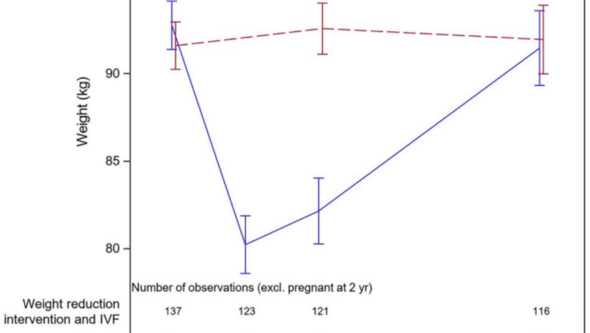- Home
- Research
- Find research
- Linda Kluge: Obesity and in vitro fertilization
Linda Kluge: Obesity and in vitro fertilization
Women with obesity may be denied in vitro fertilization (IVF) at publicly funded Swedish clinics, based on their BMI. Researcher and midwife Linda Kluge argues that the BMI limits for the initial IVF consultation should be eliminated.
LINDA KLUGE
Doctoral Thesis: Obesity and IVF outcome – The hope of improvements through weight reduction
Research Area: Obstetrics and Gynecology
Sahlgrenska Academy, The Institute of Clinical Sciences
Women with overweight and obesity (severe overweight) have a lower chance of having children through in vitro fertilization (IVF) than women of normal weight. They also face a higher risk of complications.
In her doctoral thesis, Linda Kluge shows that weight loss treatment before IVF did not result in a higher number of live births. The study included 317 women with obesity class I, which means a Body Mass Index (BMI) between 30 and 34.9 kg/m2.

Half received help with weight loss
“We randomly assigned the women to either receive help with weight loss before IVF or to proceed directly with IVF. We also conducted a follow-up after two years to assess whether weight loss had a long-term effect,” says Linda Kluge, a midwife at Reproductive Medicine at Sahlgrenska University Hospital. “Six years after they initially joined the study, we interviewed 17 women about their experiences of participating. Finally, we examined national data to find out the differences in the number of children born after IVF and the number of complications for both mother and child in pregnancies resulting from IVF.”

“Surprising results”
What are the most significant research findings?
“The women who received weight loss treatment before IVF lost an average of 9.1 kg. However, the study shows that they didn’t have a greater chance of having a baby than the women who didn’t lose weight, which was surprising.”
“The number of births after the first IVF treatment in the group of women who didn’t lose weight was much higher than expected. The results were in line with national data from the quality register for IVF in Sweden.”
Did you find any connection between overweight and the risk of complications?
“Yes, national registry data confirmed that women with overweight and obesity have an increased risk of complications during pregnancy and childbirth for both the mother and the child compared to women of normal weight.”

“BMI limits for a first visit should be removed”
Publicly funded clinics that perform IVF in Sweden have BMI limits that women must adhere to in order to access treatment. Most clinics have a limit of 35 kg/m2, while two clinics have a limit of 30 kg/m2.
“Despite our study showing that weight loss didn’t result in a higher number of live births, the lower BMI limits remain. The hope with the remaining BMI limits is probably that weight loss will lead to a decrease in complications. However, this is not proven except for women who have lost a significant amount of weight after a gastric bypass surgery,” says Linda Kluge.
How do you view the fact that there are still BMI limits for accessing IVF?
“I believe that the BMI limits for a first visit should be removed. Instead, an individual assessment should be made for each woman. Several other factors, such as age, also affect the outcome of IVF. This should also be considered, not just BMI.”
What did the long-term follow-up of women who participated in the study reveal?
“After two years, we saw that the women who had lost weight before IVF had regained weight. The number of children born was equivalent in both groups. The interviews showed that the women were happy to have been offered the opportunity to participate in the study. They believed that weight loss treatment with support should be offered to women with obesity undergoing IVF.”
Text: Jakob Lundberg
